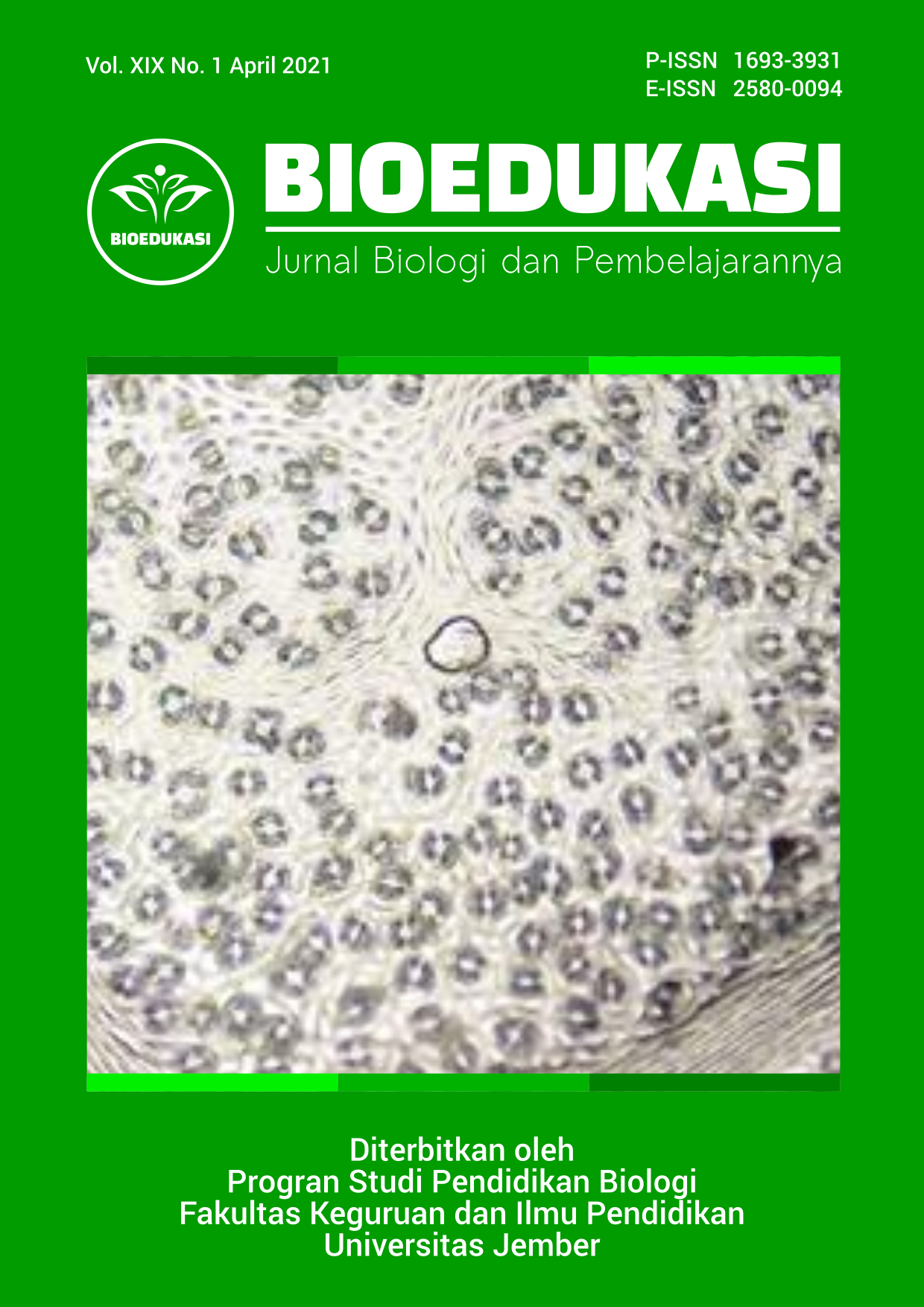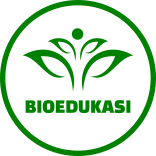TEACHING GENETICS THROUGH DIFFERENTIATED SCIENCE INQUIRY BASED ON RESEARCH RESULTS OF GENE VARIATION ANALYSIS TO INCREASE COGNITIVE LEARNING OUTCOMES UNDERGRADUATE BIOLOGY STUDENT
DOI:
https://doi.org/10.19184/bioedu.v19i1.20722Keywords:
Differentiated, Inquiry, Genetics, Learning OutcomeAbstract
Paradigm change in 21st century poses a challange for higher education in teaching science as inquiry. In another side, teaching science as inquiry meet some problem because of every student in the classroom was different. This research is aimed to know effectiveness of differentiated science inquiry based on research results of gene variation analysis in genetics course to increase students cognitive learning outcome. This research used pre-experimental research design on one class that consist of 26 biology students. Statistical analysis used in this study is paired sample t-test on pre-test and post-test to measure students cognitive learning outcomes. If there are significances between the pretest and posttest, data analysis was continue to N-Gain score to determine the increasing category of students cognitive learning outcome. The average pretest score was 64,3 and posttest score was 77,2. The statistical analysis result showed there was a significant difference between students cognitive learning outcome (p<0,005), meanwhile the N-Gain score between pretest and postest is 36,2 and categorized a medium criteria. That result mean although there are difference students learning outcome before and after learning by using differentiated science inquiry model based on research result of gene variation analysis, that learning is not too recommended to increase students cognitive learning outcome.
Downloads
References
Ai Y, Jermiin L, Firth N. 2012. Teaching bioinformatics: A student-centred and problem based approach. Int J Innov Sci Math Educ. 10(1).
Almroth BC. 2015. The importance of laboratory exercises in biology teaching ; case study in an ecotoxicology course. Pedagog Dev Interact Learn.(september):1–11.
Babione CA. 2015. Practitioner Teacher Inquiry and Research. United States of America: Wiley.
Banchi H, Bell R. 2008. The many levels of inquiry. Sci Child. 46(2):26–29.
Bevins S, Lehane L, Booth J. 2018. Comparative Perspectives on Inquiry-Based Science Education. 1st ed. United States of America: IGI Global.
Bybee RW. 2013. The teaching of science : 21st-century perspectives. USA: NSTA Press.
Çimer A. 2012. What Makes Biology Learning Difficult and Effective: Students’ Views. Educ Res Rev. 7(3):61–71. doi:10.5897/ERR11.205.
Corder G, Slykhuis J. 2011. Shifting to an Inquiry-Based Experience. Sci Child. 48(9):60–63. https://eric.ed.gov/?id=EJ944172.
Dorier J-L, GarcÃa FJ. 2013. Challenges and opportunities for the implementation of inquiry-based learning in day-to-day teaching. ZDM. 45(6):837–849. doi:10.1007/s11858-013-0512-8. http://link.springer.com/10.1007/s11858-013-0512-8.
Eriksson I V. 2008. Science Education in the 21st Century. New York: Nova Science Publishers.
Fauzi A, Fariantika A. 2018. Courses perceived difficult by undergraduate students majoring in biology. Biosfer. 11(2):78–89. doi:10.21009/biosferjpb.v11n2.78-89. http://journal.unj.ac.id/unj/index.php/biosfer/article/view/7714.
Fitzgerald M, Danaia L, McKinnon DH. 2019. Barriers Inhibiting Inquiry-Based Science Teaching and Potential Solutions: Perceptions of Positively Inclined Early Adopters. Res Sci Educ. 49(2):543–566. doi:10.1007/s11165-017-9623-5. http://link.springer.com/10.1007/s11165-017-9623-5.
Hake R. 1999. Analyzing Change/ Gain Score. Indiana: Indiana University.
Jill L, Adelson JL. 2011. An Investigation of Preservice Teachers ’ Confidence Regarding Educational Inquiry A Stance toward Inquiry : :69–95.
Lepareur C, Grangeat M. 2018. Teacher collaboration’s influence on inquiry-based science teaching methods. Educ Inq. 9(4):363–379. doi:10.1080/20004508.2018.1428037. https://www.tandfonline.com/doi/full/10.1080/20004508.2018.1428037.
Liu OL, Lee H-S, Linn MC. 2010. Multifaceted Assessment of Inquiry-Based Science Learning. Educ Assess. 15(2):69–86. doi:10.1080/10627197.2010.491067. http://www.tandfonline.com/doi/abs/10.1080/10627197.2010.491067.
Llewellyn D. 2010a. Differentiated Science Inquiry. United States of America: Corwin.
Llewellyn D. 2010b. Differentiated Science Inquiry. United Kingdom: Corwin.
Llewellyn D. 2012. Teaching High School Science Through Inquiry and Argumentation. United Kingdom: Corwin.
Maeng JL, Bell RL. 2015. Differentiating Science Instruction: Secondary science teachers’ practices. Int J Sci Educ. 37(13):2065–2090. doi:10.1080/09500693.2015.1064553. http://www.tandfonline.com/doi/full/10.1080/09500693.2015.1064553.
Minner DD, Levy AJ, Century J. 2010. Inquiry-based science instruction-what is it and does it matter? Results from a research synthesis years 1984 to 2002. J Res Sci Teach. 47(4):474–496. doi:10.1002/tea.20347. http://doi.wiley.com/10.1002/tea.20347.
National Research Council (NRC). 1996a. National Science Education Standadrs. Washington DC: National Academies Press.
National Research Council (NRC). 1996b. National science education standards. Washington DC: National Academies Press.
National Research Council (NRC). 2000. Inquiry and the National Science Education Standards: A Guide for Teaching and Learning. Washington DC: National Academies Press.
Quigley C, Marshall JC, Deaton CCM, Cook MP, Padilla M. 2011. Challenges to Inquiry Teaching and Suggestions for How to Meet Them Challenges to Inquiry Teaching and Suggestions for How to Meet Them - ... Sci Educ. 20(1):55–61.
Sholikhan S. 2017. Understanding Concepts Through Inquiry Learning Strategy. IOSR J Res Method Educ. 07(01):97–102. doi:10.9790/7388-07010597102.
Towers J. 2012. Administrative supports and curricular challenges: New teachers enacting and sustaining inquiry in schools. Can J Educ. 35(1):259–278.






